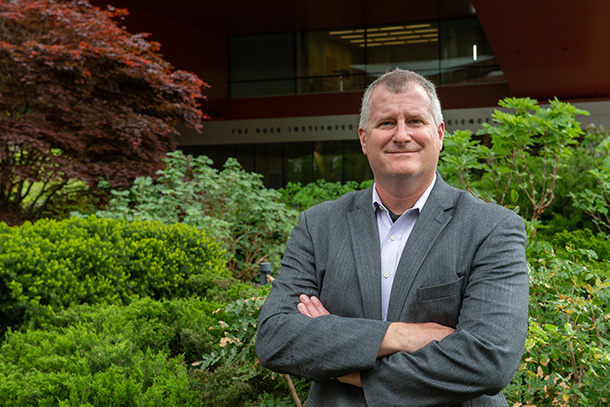
Dan Hayes, a Penn State alumnus and current professor, is the new head of the Department of Biomedical Engineering, effective July 1. Credit: Kelby Hochreither/Penn State
Alumnus and professor named new head of biomedical engineering
June 22, 2022
By Ashley J. WennersHerron
UNIVERSITY PARK, Pa. — When Dan Hayes graduated from the Penn State Eberly College of Science with a bachelor’s degree in science in 1997, the Department of Biomedical Engineering was still three years away from forming. With an interest in nutrition research and a few engineering courses under his belt, Hayes landed a research assistantship at New York University, studying neural development. This led to opportunities to conduct research at the Penn State Nanofabrication Facility, join the College of Engineering’s doctorate program in engineering science and mechanics and, later, launch a career in both academia and industry.
Now, Hayes will lead the Department of Biomedical Engineering. His tenure as department head begins July 1.
His path was winding but such an approach is becoming more common, according to Hayes, professor of biomedical engineering, director of the Penn State Center of Excellence in Industrial Biotechnology and Dorothy Foehr Huck and J. Lloyd Huck Chair in Nanotherapeutics and Regenerative Medicine. After earning his doctorate in 2004, during which he studied how nanofabrication intersects with biology, Hayes joined Louisiana State University (LSU) as an assistant professor of biological engineering. He returned to Penn State as an associate professor in 2016, and he remains an adjunct faculty member in biological engineering and chemistry at LSU. In addition to his career in academia, Hayes has also founded three companies.
“My education and career path mirror the broadness of biomedical engineering across fields,” Hayes said. “I’m probably from one of the first generations of students trained as a convergent researcher. Now, everyone understands the need for inter- and multidisciplinary research, especially as it relates to health and disease.”
Hayes researches and engineers advanced biomaterials for applications ranging from regenerative medicine to lab-on-a-chip technologies to drug delivery systems. He holds 10 patents, with another nine pending, based on his research. The work reflects several areas of expertise and the value of collaboration across Penn State, Hayes said.
“Biomedical engineering is central to the future of Penn State, not only for the University’s research impact, but for the education of future engineers and scientists,” Hayes said. “Innovative, cross-cutting and leading-edge research is critical to education. The best way to train the people who will build on current research is by having them research and make the connections to expand beyond today’s questions to tomorrow’s answers.”
By positioning the department to partner with units more broadly across Penn State, as well as expanding undergraduate research opportunities and growing graduate programs, Hayes said his plans can be summed up in one word: impact.
“I’ve worked with the faculty and staff in biomedical engineering for six years and with others across the University for more than 25 years,” Hayes said. “I have no doubt that, together, we will develop new research centers that join varied knowledge and resources, and we will establish joint faculty appointments to leverage specialized, intersecting expertise. Biomedical engineering is a young program, and it will only become more valuable to the University as it grows and matures.”
Hayes said he aims to continue fostering a culture that values diversity, both in research and in people, to strengthen the department.
“Dr. Hayes is both an excellent researcher and an exceptional colleague,” said Justin Schwartz, Harold and Inge Marcus Dean in the College of Engineering. “He most recently served as the college’s ombudsperson, a leadership role requiring the utmost trust of peers and respect of the University faculty senate to successfully resolve conflicts and elevate systematic issues for organizational review. With an extensive record of service to both Penn State and his profession, especially as a mentor for junior faculty, Dr. Hayes has clearly demonstrated how care and collaboration produces strong research that impacts and inspires others.”
Hayes, who grew up in State College, said he dreamed of becoming a Penn State faculty member while he was in school.
“I’m very excited to lead the Penn State Department of Biomedical Engineering,” Hayes said. “There’s no limit to what you can achieve as a Penn State biomedical engineer.”



